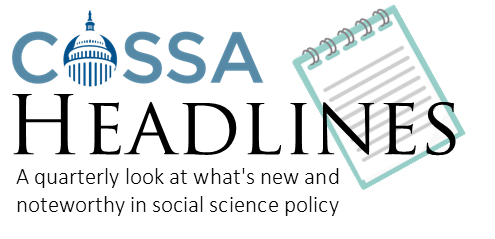Issue 4 (March 1)
Nelson, Collins Step in to Lead White House Science Efforts
On February 16, the White House announced the appointment of Dr. Alondra Nelson as the interim director of the Office of Science and Technology Policy (OSTP) effective immediately, replacing Eric Lander who stepped down last month amid allegations of workplace bullying. Dr. Nelson, a sociologist, is currently serving as OSTP Deputy Director for Science and Society. In addition, Dr. Francis Collins, who recently retired as Director of the National Institutes of Health (NIH), has been asked to step in as the President’s Science Advisor and Co-Chair of the President’s Council of Advisors on Science and Technology. Both Nelson and Collins will serve in their respective capacities until permanent leaders are nominated and confirmed. Lander previously held both positions as head of OSTP and Presidential Science Advisor.
March Headlines to Feature Deep Dive on Virtual Advocacy

COSSA members are encouraged to sign up for the monthly COSSA Headlines webinar on Thursday March 10, in which COSSA staff will break down the most important social and behavioral science news from the past month. The March webinar will feature a deep dive discussion with the COSSA team on advocating virtually for the social and behavioral sciences. Individuals employed by or affiliated with a COSSA member organization or university can register for the webinar here.
Smithsonian Ambassador-at-Large Richard Kurin Answers “Why Social Science?”

This week’s Why Social Science? post comes from XXXX.
The latest Why Social Science? guest post comes from Richard Kurin, Distinguished Scholar & Ambassador at Large at the Smithsonian Institution, who writes about the role social science plays in protecting and preserving cultural heritage.
Science Funding, Aid to Ukraine, and a Supreme Court Nomination
Congress will have its hands full over the coming weeks as lawmakers attempt to finish up fiscal year (FY) 2022 appropriations bills while also seeking emergency aid to Ukraine. Senators will have an especially busy schedule as they begin consideration of Supreme Court nominee Ketanji Brown Jackson. We are likely to see attempts to provide funding for Ukraine as part of a package that will also include the FY 2022 bills. As previously reported, Congress has until March 11 to complete the appropriations for the fiscal year that is nearly half over. The next few weeks will be critical for finally putting FY 2022 behind us and getting started on the FY 2023 bills. COSSA will be watching for Congress to release their final FY 2022 bills in the coming days and will provide an analysis when details become available.
Congress Continues Focus on Mental Health in Subcommittee Hearing
On February 17, the House Energy and Commerce Oversight Subcommittee held a hearing to discuss the national mental health crisis and plans to address it. The hearing, overseen by Subcommittee Chair Diana DeGette (D-CO) and Ranking Member Morgan Griffith (R-VA), is the third Congressional hearing in the past month focused on potential policy solutions related to mental health (see previous coverage for more details). The witnesses present at the hearing were American Psychiatric Association member and vice-chair of psychiatry at the University of California, San Francisco Dr. Lisa Fortuna, assistant professor of psychiatry and human behavior at Brown University Dr. Jacqueline Nesi, CEO and executive director of the Trevor Project Amit Paley, co-founder of the Defensive Line Christopher Thomas, and former assistant Health and Human Services (HHS) secretary for mental health and substance abuse Dr. Elinore McCance-Katz.
Subcommittee Chair DeGette focused her opening statement on how the mental health crisis has disproportionately affected marginalized individuals, particularly people of color, members of the LGBTQ community, people with disabilities, and youth. Ranking Member Griffith focused his opening statement on issues of accessibility related to mental health care and how the intersection of substance use and the mental health crisis should be addressed. Many of these themes were repeated in the opening statements of the witnesses, who emphasized the particularly damaging effects of the mental health crisis on children, particularly in marginalized communities. Additionally, many of the witnesses stated the importance of increasing accessibility to mental health coverage for the American people and the discussed the benefits of telehealth services. While some Subcommittee members focused their questions on the effects of masking on mental health, most members asked about ways to best address the nation’s mental health needs, what can be done to support marginalized groups, and how to best serve Americans who are experiencing mental health crises. Subcommittee Chair DeGette concluded the hearing by stating the committee’s bipartisan interest in reauthorizing programs under the committee’s jurisdiction as well as expressing the committee’s interest in championing future legislation to address the mental health crisis. A recording of the hearing is available on the Subcommittee website.
NIH Seeking Comments on Upcoming Diversity Strategic Plan
The National Institutes of Health (NIH) has released a Request for Information (RFI) seeking stakeholder comments in regards to the proposed framework for the NIH-Wide Strategic Plan for Diversity, Equity, Inclusion, and Accessibility (DEIA) currently in development. This strategic plan is being developed in response to an Executive Order on Diversity, Equity, Inclusion, and Accessibility in the Federal Workforce released in June 2021 by the Biden Administration. The framework currently names three major objectives of the strategic plan:
- Implement organizational practices to center and prioritize DEIA in the workforce;
- Grow and sustain DEIA through structural and cultural change; and
- Advance DEIA through research.
Comments will be accepted through April 3, 2022. More information is available in the Federal Register notice.
Bob Valdez Named New ARHQ Director
On February 22, the Agency for Healthcare Research and Quality (AHRQ) announced that Robert “Bob” Otto Valdez had been appointed as the agency’s director and would assume leadership responsibilities immediately. Dr. Valdez comes to the agency with a lengthy career in health disparities research and policy, having previously been the Deputy Assistant Secretary for Health and Director of Interagency Health Policy during the Clinton Administration. He has also served as the Robert Wood Johnson Foundation Professor Emeritus of Family & Community Medicine and Economics at the University of New Mexico and led several global health initiatives focused on health promotion and disease prevention among Hispanic Americans and Spanish speaking populations. A bio of Dr. Valdez is available on the AHRQ website.
NSF Announces New “Open-Source Ecosystems” Program
The National Science Foundation (NSF) has established a new interdisciplinary program called “Pathways to Enable Open-Source Ecosystems” (POSE), which is intended to “harness the power of open-source development for the creation of new technology solutions to problems of national and societal importance.” The program will fund the establishment of entities to manage networks of open-source products and platforms with the goal of ensuring “more secure open-source products, increased coordination of developer contributions, and a more focused route to impactful technologies.” The program will accept two types of proposals: Phase I projects, focused on “scoping” the development of a potential Open-Source Ecosystem (OSE), and Phase II projects, which will develop a sustainable OSE based on an existing open-source product. Proposals for Phase I projects are due May 12, 2022, and Phase II products are due October 21, 2022. More details are available in the full program solicitation.
PAA to Host Virtual Briefing on Trends Affecting Rural Communities
The Population Association of America (PAA), a COSSA governing member, is hosting a Congressional briefing entitled “Small Towns/Big Trends: Demographic Insights on Living, Working, and Thriving,” that will feature an expert panel presenting research regarding demographic, economic, health, and environmental challenges and opportunities facing U.S. rural communities. The virtual briefing will take place on March 18, at 12:00 pm ET. Participants can register for the briefing here.

